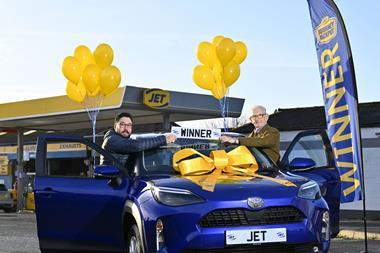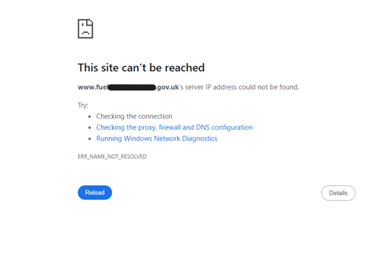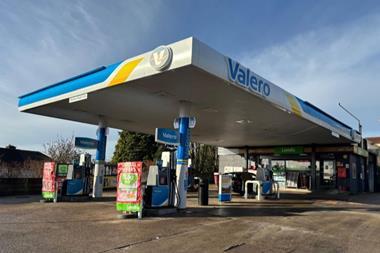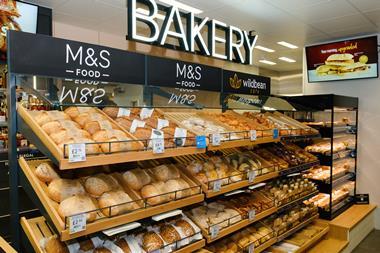BACKGROUND
QUESTION: You’ve done 20 years with BP. Please could you give us some background about what you’ve done within the company.
My background has been with BP in the downstream for 23 years, mostly working in markets outside the UK, but very much involved in the retail and supply areas which is very helpful coming into this role, which is broader than previously. BP has now chosen to put the fuels, logistics and convenience retail business all under one umbrella in the UK and I’m now heading that up.
UK MARKET VIEW AND BP’S POSITION
QUESTION: Having arrived in the UK how do you see the state of the retail market and BP’s position within it, and how do you see 2010 panning out?
The market itself is big the fourth largest in the EU. But it is flat in terms of the demand for our core products petrol and diesel. We have nine well-established competitors five oil majors and four hypers plus a number of independents. We’ve done some work which shows it is, in fact, the most competitive market in Europe. So my first view is, this is looking difficult. But what’s heartened me is BP’s position within that market. We’re here as a market leader, and we have around 16% retail market share across the UK. We are the leading brand, we have well-located sites, and I think we’ve developed some strong offers. When one looks at our partnership with M&S, the Wild Bean Café offer, which we are keen to expand, our Ultimate premium fuels, and our loyalty programme Nectar, they represent four contributions to our customers that are making a difference in the market.
This year has been tough. We’ve seen generally negative growth in the retail space in fuels. We have seen a more stable situation around the convenience area, but I think it’s fair to say we’ve found it difficult, and it’s put more pressure on us to look at our cost base, and strive to become more competitive. In that sense I would think that we in BP are no different to any of our dealer partners who have had to look at their businesses similarly.
Looking forward it’s difficult to predict. Our view is at best we could see flat demand next year, but it is likely to be slightly in decline again. One is looking, of course, for the economic upturn to kick in at some point during 2010 and I’m hopeful that at the end of 2010 we will start seeing the beginnings of an upturn in demand. When we look at the medium term outlook, there are forces which continue to drive our demand down against those forces such as economic development which will nudge it up. Those forces are very much driven by the EU’s emissions’ legislation, which is encouraging more efficient diesel and petrol engines, meaning consumers can get more kilometres for every litre they put in to their truck or car. And we also, as oil companies, enhance the development of fuels in conjunction with the original equipment manufacturers. Hence our outlook for the medium term is at best flat.
PLANS FOR REFINERIES
QUESTION: BP has no refineries in the UK and is now not an integrated oil company, is that an advantage or disadvantage?
The hypers have managed to grow their share of the retail fuels business in the UK without having refineries. In fact 60% of the fuels that are sold through retail sites in the UK are sold through companies that don’t have refineries, so I’m not sure that refining is a key to success in the longer term. The winners are those that have strong brands, well-located service stations, and compelling offers for their customers. We’re seeing the emergence of two camps in the UK. There are the hypers who have been able to demonstrate significant market share growth in the past 15-20 years in the UK, with essentially a price proposition to the customer linked to activity in the hypermarket. The hypers’ approach is to make sure they can maximise footfall through the hypermarket using fuel as a lever. I don’t see them as direct competitors to the second camp that we compete in which is what I call the convenience segment. This is frequented by, typically, the oil majors, and here we see different characteristics of winning having sites in the right places, which are underpinned by strong offers on site, with a well-known brand and premium products. It’s looking quite crowded in that camp, and I would expect to see some shakeout in the medium term.
ARE DEALERS IMPORTANT?
QUESTION: If BP is not a refiner in the UK, are dealers important to BP going forward?
Dealers are incredibly important to BP and our strategy here in the UK. I view dealers as strategic partners of BP. We have 1,200 sites in the UK carrying the BP brand, and around 850 of them are represented by our dealers, so the impression that our customers have of BP is even more defined by our dealers than it is by our own sites that we operate. For me, the power of BP as a brand in the UK can only really be developed if we and our dealers work together to build and harness that power. Dealers are fundamental to our winning in the UK, and I look forward to investing a lot of my time and effort in the relationships in the dealer network.
PREMIUM AND BIOFUELS
QUESTION: You’ve talked about the four legs to BP’s programme going forward, one of which is the Ultimate grades, do you see a future for them?
There’s definitely a future for premium gasoline and premium diesel grades. With the pressures from the EU to reduce emissions, car manufacturers need to work very closely with companies like ourselves, to develop more efficient engines and more efficient fuels, to respond to those challenges. So the role of premium fuels as a contributor to driving down emissions in the UK, and for increasing efficiency of the fuels in the UK market, means there is going to continue to be a very strong place for premium fuel.
QUESTION: What are BP’s views about biofuels and alternative energies fuelling motor cars in the future?
The EU emissions’ legislation is very much what’s driving what we’re now seeing in terms of increasing contribution of biofuels to the fuels pool in the UK. We have recently invested considerable amounts in our terminals along the UKOP pipeline to be ready for those challenges, and to ensure that we can produce the biofuel grades that have been specified by the UK authorities. Our view is that we will continue to see an increasing contribution from biofuels into the petrol and diesel pool here. We currently have B5 and E5 grades, and I can see us moving towards B7 and E10 in the next three to four years in order to meet the requirements that have been laid out by the regulatory authorities. To that end we are preparing our terminals to be able to meet those demands.
If we look medium and longer term, there will be natural limits to what we can expect in terms of the contribution from biofuels. Some of our dealer partners may be wondering how many grades they should be designing for on their forecourts. In the short to medium term we would still see four grades as being the right number. The advent of new biofuel products is essentially going to replace the regular grades that we see today with the premium petrol and diesel also, I think, being enhanced over time. If we look medium and longer term and I’m now talking 2015 and beyond it’s not inconceivable that we might start to see the advent of a fifth grade which would be a very high biofuel content, to meet some of the potentially octane-increased expectations related to engine technology development.
M&S RELATIONSHIP
QUESTION: Can you tell us about the M&S relationship, and is this something that’s going to grow in the future?
We’re very pleased with the M&S partnership. I think the combination of M&S with BP has been well received by consumers. Certainly if I look at the growth this year in the M&S stores we’ve seen a very much improved performance versus the industry norms in forecourt shops. I think the M&S and BP brand go very well together. They’re both perceived generally as premium brands. We have already put more than 100 of these stores onto our sites and we will be looking to take that up on our company-owned estate. We’re very pleased with the way Wild Bean the coffee and food-to-go offer has been accepted by forecourt customers. We have a number of Wild Beans now on our company-owned estates and some of our dealers have taken on the offer too, and I think it’s worked generally very well. I’m seeing growth potential here, because as I look around the UK market there don’t appear to be many compelling coffee/food-to-go offers in the forecourt space. I think Wild Bean has the opportunity with the reputation it’s built with consumers to actually have more legs, and I would encourage more of our dealer partners to talk to us about how we can jointly expand that offer.
FUEL CARDS
QUESTION: BP has a substantial fuel cards business, with fuel cards agency and Routex. Do you see growth in these areas?
To be a successful fuel card provider, you need to have access to a network which is well-positioned across the UK and I feel we have that position. I’m looking for us to build further on it with our dealers, because I feel we have the scale which is quite unique in the UK market. One of the interesting things we notice is that more than half of fuel card volumes are processed through companies that don’t own networks or have fuel brands. It occurs to me that there might be an opportunity for BP to look to increase its share of the fuel card market given that we have a nationally-based network, a well-recognised brand, and increasingly arrangements with other fuel companies, with respect to cross-acceptance of the BP card.
TREND OF SELLING DOWNSTREAM ASSETS
QUESTION: Major oil companies have sold off downstream assets (Conoco and Chevron) and there are rumours of Stanlow being sold. Do you see a continuing trend of downstream assets being sold to fund upstream operations for oil companies?
Fuels downstream businesses need to pay their own way. It’s no different to the businesses our dealer partners have. We have to generate enough cash in order to effectively pay a dividend in our case a contribution to BP’s group dividend and to reinvest in the business. We also need to generate returns which are attractive enough to make it worthwhile being in the market. For now my priority is making sure that BP’s fuels business in the UK is able to meet the expectations of our shareholders, with respect to the cash that’s generated from the business and the returns that the business makes.
BP CONTINUING AS ANATIONAL UK SUPPLIER
QUESTION: Is it BP’s intention to continue being a national supplier in the UK?
We’ll continue to keep the brand in those geographies where we can be competitive in terms of supply, and currently that covers most of the UK. Some people may be aware that we’re looking to dispose of some of our terminals in the north of the country. That doesn’t mean we’ll be withdrawing our brand from those areas. But we think we have more competitive, cost-effective ways of supplying our customers in those areas without having to own and operate the terminals there.
VISION OF THE FUTURE
QUESTION: Being a marketer over 23 years, you have to be an optimist. Are you optimistic about the UK retail market?
I am an optimist about BP’s future. I look at our position here and see a well-recognised brand and good representation across the UK. I see some strong offers that we’ve developed together in the shop space in particular with respect to the M&S partnership and Wild Bean; in premium fuels with respect to Ultimate; and with the unique multi-partner aspect of the Nectar loyalty programme. At the end of the day we’re going to live or die together. More than half the sites in the UK owned by dealers that pump significant quantities five million litres per annum carry the BP brand. So together we have a strong position. Where we need to move forward is to ensure we create a more consistent experience for our customers when they come onto a BP-branded site whether it’s owned by BP or a dealer because that’s the way together we’ll be able to build an enduring position for the BP brand in the UK market.



























No comments yet